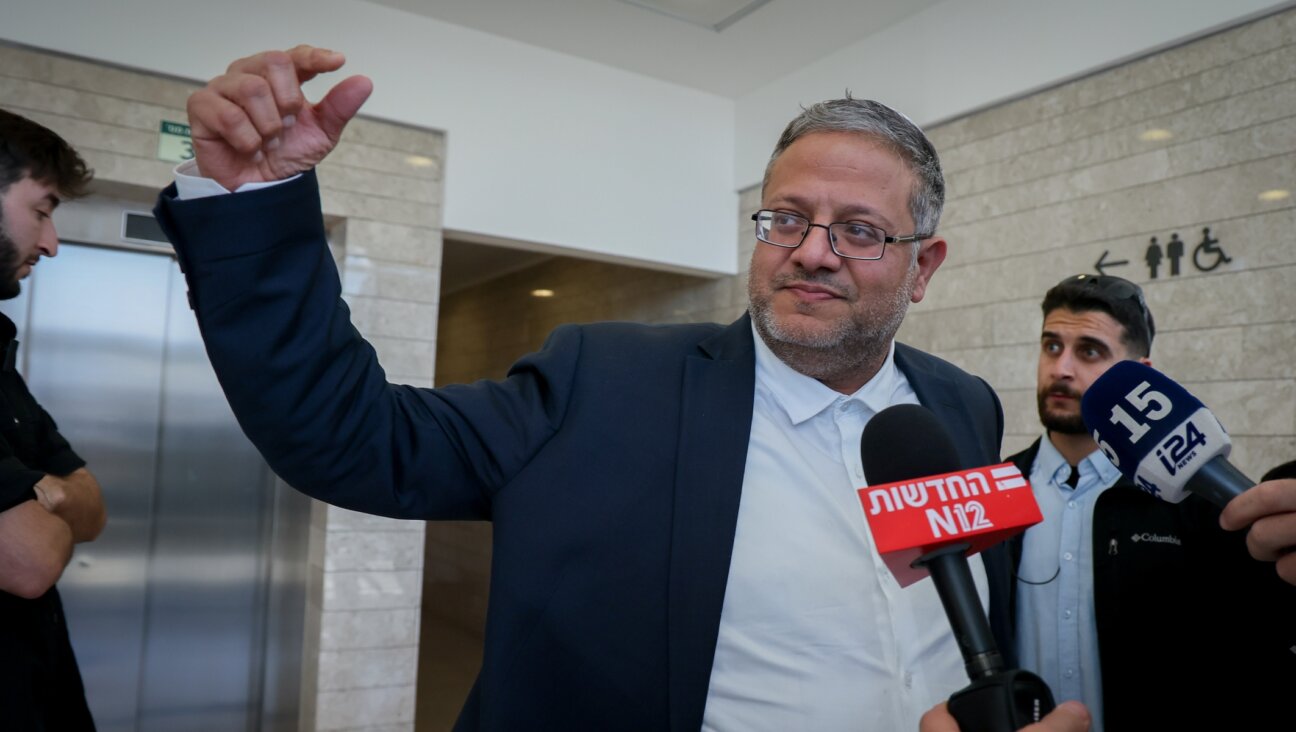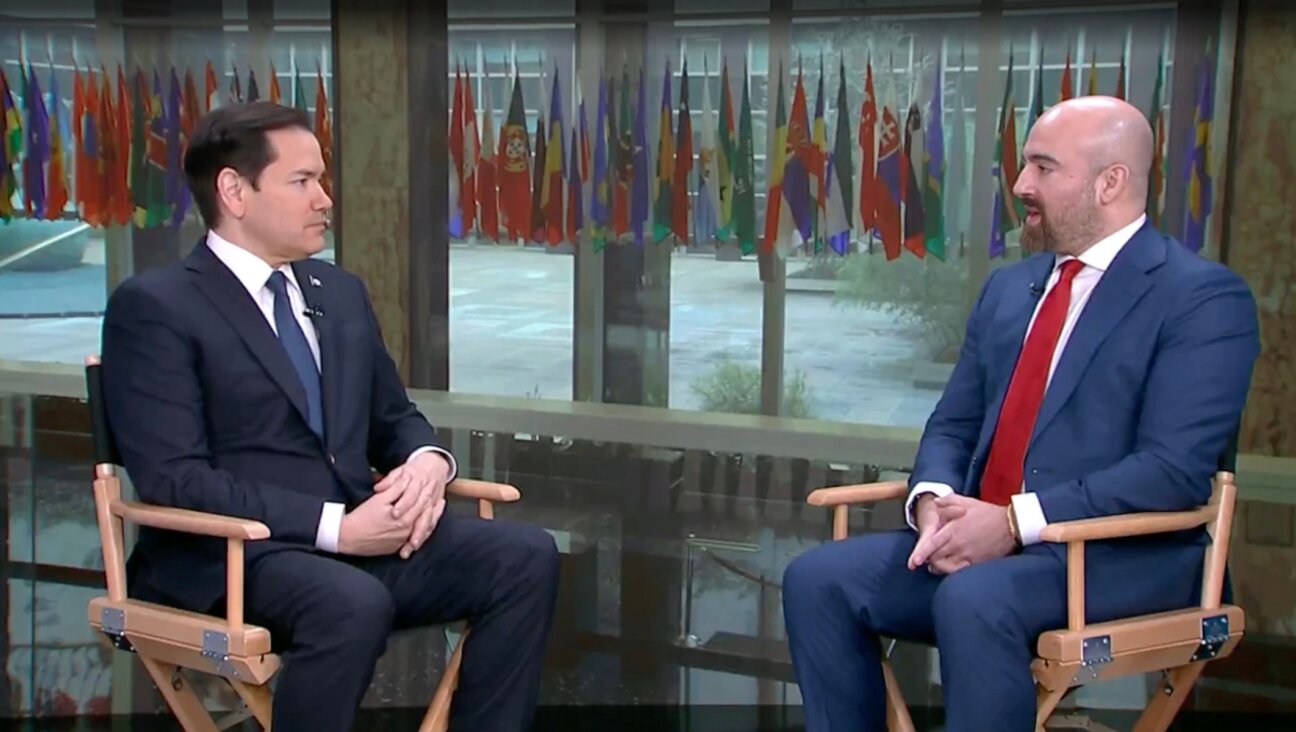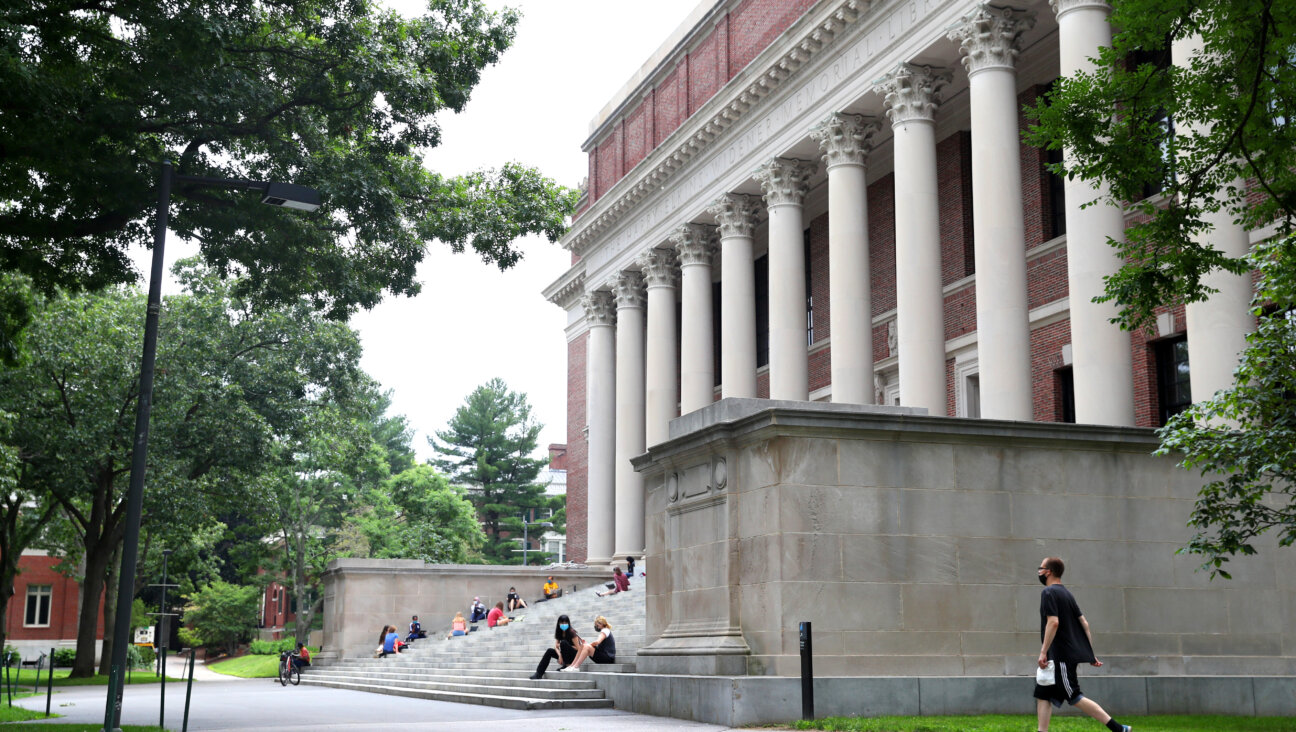Hollinger Woes Casting a Pall Over Future of Neocon Papers
A convergence of unrelated financial scandals is threatening to sink the tiny but influential boat of Jewish-flavored conservative journalism.
At the center of the controversy is Hollinger International, a media company that owns dozens of conservative newspapers, including the hawkish Jerusalem Post. An internal investigation into improper payments allegedly made to Hollinger’s majority owner and CEO, Conrad Black, and its president, F. David Radler, has triggered a major reorganization of the company.
Radler, who oversaw the Jerusalem Post, has resigned. Black has stepped down as CEO, but will continue to play a role in planning what is expected to be a mass sell-off of the company’s media holdings.
Many media insiders are predicting the shakeup will lead to the sale of most Hollinger-controlled newspapers, including The Jerusalem Post, The Daily Telegraph of London and the Chicago Sun-Times. Hollinger also owns a piece of The New York Sun, which was launched in 2002 by former Forward editor Seth Lipsky. Though ostensibly a general interest newspaper, the Sun is best known for its pugnacious coverage of Jewish-related issues, as well as its neo-conservative policy positions.
Hollinger’s stake in the Sun is relatively small, but financial problems have also threatened Roger Hertog, the newspaper’s main financial backer and also a part-owner of The New Republic, a highly influential Washington-based opinion journal with a heavy interest in Jewish issues. Hertog’s potential troubles relate to his post as vice chairman of Alliance Capital. The company is being investigated by New York Attorney General Eliot Spitzer for improper trading moves and has put aside $190 million to cover restitution and legal costs relating to the case.
Alliance Capital is also being investigated by the Securities and Exchange Commission for payments to Morgan Stanley to obtain preferred status with investors.
Some of the allegations at Alliance Capital surround suspicious trading activity at mutual funds it purchased from the company of the late Jewish philanthropist Zalman Bernstein, where Hertog was formerly president and CEO.
A financially induced collapse at the Sun or political shift to the left at The Jerusalem Post would represent a severe blow to conservative Jewish activists who have come to depend these publications as dependable allies in various policy fights. Since it is not yet clear how, and whether, the troubles at Alliance Capital will affect Hertog, for now the more furious speculation is focused on Hollinger and the fate of The Jerusalem Post.
“This is one of the most famous brand names in Israel alongside Jaffa oranges,” said one former employee. “And there is a major change coming to the Post; a fundamental change in the way the paper operates.”
The Post was historically known as a left-wing newspaper, until its acquisition by Hollinger in 1989. Since then it has become a leading conservative outlet for opponents of the peace process throughout the world, thanks to its highly popular Web site.
While the political future of the newspaper remains unclear, most observers are predicting the newspaper will be sold.
Rumors about an impending sale were rippling through a gathering in Israel this week of 4,000 North American Jewish communal leaders. “The air at the General Assembly [of the United Jewish Communities] is thick with rumors of potential buyers,” said David Landau, editor of the English edition of the Israeli daily Ha’aretz.
“I think that obviously you are looking at wealthy Jews who are interested in extending their influence,” one Israeli media insider said. “I don’t know that any Israelis would buy it.”
Speculation has focused in part on Michael Steinhardt, the New York-based Jewish philanthropist with stakes in the Sun and The New Republic. Formerly a part-owner of the Forward, Steinhardt has previously displayed interest in buying the Post. Another name being mentioned is that of Ronald Lauder, the cosmetics heir who already has holdings in Israeli media. Russian investors Vladimir Gusinsky and Roman Abramovich also have been rumored to be interested.
Given Hollinger’s $730 million of debt, observers see no way for the company to survive without selling at least some of its assets. Numerous parties have expressed interest in The Daily Telegraph, and The Washington Post Group has been repeatedly mentioned for its interest in the Chicago Sun-Times. An Israeli media insider said the assumption is that the Post will be sold separately from the rest of the Hollinger papers.
In the past, Black, who gave up his Canadian citizenship to become a British lord, has defended his company’s dealings with a brashness for which he is famous. When minority investors called for an investigation at Hollinger earlier this year, he called them “zealots” who were caught in the “fad” of corporate governance. But on Monday he released a statement recognizing that “the present structure of the group clearly must be renovated.”
Many former employees of the Post say the departure of Radler as chairman of the newspaper’s board does not come soon enough. When Hollinger first bought the Post, an ensuing editorial clash led to the resignation of 30 members of the Post’s editorial staff, including the top two editors.
Landau, who resigned as managing editor at the time, said that after this exodus of employees, “the rump paper lurched 180 degrees to the right, and plummeted from journalistic excellence to journalistic non-credibility.” The free-market-oriented and hawkish editorial policies that Radler brought to the Post were staples of other Hollinger newspapers.
The early resignations brought on by the heavy-handed editorial policy were followed by a number of firings and a vigorous effort to break the newspaper’s labor union.
On hearing of Radler’s resignation, Landau said, “I remembered the biblical injunction against rejoicing at the downfall of people who deserve to fall down.”
Radler has not shied away from admitting the “ruthless” cost-cutting measures he used to turn a profit. In one interview in Maclean’s, he said: “I visit the office of each prospective property at night and count the desks. That tells me how many people work there. If the place has, say, forty-two desks, I know I can put that paper out with thirty people, and that means a dozen people will be leaving payroll even though I haven’t seen their faces yet.”
An internal investigation at Hollinger, the results of which were released Monday, found that Black and Radler had each been paid $7.2 million in 2000 and 2001 from a $73.7 million “non-competition” agreement with a chain of Canadian papers. The payments to Black and Radler were not authorized by the Hollinger board, and were inaccurately reported to the Security and Exchange Commission, according to the company’s internal report.
A company statement said Black will continue in a non-executive capacity while helping to formulate a plan for the future that could include “a possible sale of the company” or “a sale of one or more of its major properties.”
It would appear that the problems at Hollinger will have less of an impact on The New York Sun: The company reportedly owns just a 12% stake in the paper. “Conrad Black, who represents Hollinger International Inc. on the board of The New York Sun, is an active and trusted director, and we value his leadership enormously,” Lipsky, the newspaper’s president and editor, said in a statement.
Sun publicist Charlotte Ibarra said of Hollinger, “We wish them luck, but as far as we’re concerned they have a small stake in the Sun.”
One media observer in New York downplayed the potential impact on the Sun, saying, “I don’t see it as having a big impact except as a matter of perception.”
If Hertog becomes entangled in the problems at Alliance Capital, however, the consequences for the Sun could be greater. Hertog is the chairman of the Sun, and it has been reported that he owns close to half of the conservative newspaper.
The Sun declined to comment on the problems at Alliance. Hertog did not return phone calls.
The Forward is free to read, but it isn’t free to produce

I hope you appreciated this article. Before you go, I’d like to ask you to please support the Forward.
Now more than ever, American Jews need independent news they can trust, with reporting driven by truth, not ideology. We serve you, not any ideological agenda.
At a time when other newsrooms are closing or cutting back, the Forward has removed its paywall and invested additional resources to report on the ground from Israel and around the U.S. on the impact of the war, rising antisemitism and polarized discourse.
This is a great time to support independent Jewish journalism you rely on. Make a Passover gift today!
— Rachel Fishman Feddersen, Publisher and CEO
Most Popular
- 1

News Student protesters being deported are not ‘martyrs and heroes,’ says former antisemitism envoy
- 2

News Who is Alan Garber, the Jewish Harvard president who stood up to Trump over antisemitism?
- 3

Fast Forward Suspected arsonist intended to beat Gov. Josh Shapiro with a sledgehammer, investigators say
- 4

Politics Meet America’s potential first Jewish second family: Josh Shapiro, Lori, and their 4 kids
In Case You Missed It
-

Fast Forward Brooklyn event with Itamar Ben-Gvir cancelled days before Israeli far-right minister’s US trip
-

Culture How Abraham Lincoln in a kippah wound up making a $250,000 deal on ‘Shark Tank’
-

Fast Forward Marco Rubio sits down with Michael Benz, Jewish former Trump official with an antisemitic online persona
-

Sports Hapoel Tel Aviv nabs a European title, as 2 Jewish stars enter the NBA draft
-
Shop the Forward Store
100% of profits support our journalism
Republish This Story
Please read before republishing
We’re happy to make this story available to republish for free, unless it originated with JTA, Haaretz or another publication (as indicated on the article) and as long as you follow our guidelines.
You must comply with the following:
- Credit the Forward
- Retain our pixel
- Preserve our canonical link in Google search
- Add a noindex tag in Google search
See our full guidelines for more information, and this guide for detail about canonical URLs.
To republish, copy the HTML by clicking on the yellow button to the right; it includes our tracking pixel, all paragraph styles and hyperlinks, the author byline and credit to the Forward. It does not include images; to avoid copyright violations, you must add them manually, following our guidelines. Please email us at [email protected], subject line “republish,” with any questions or to let us know what stories you’re picking up.











